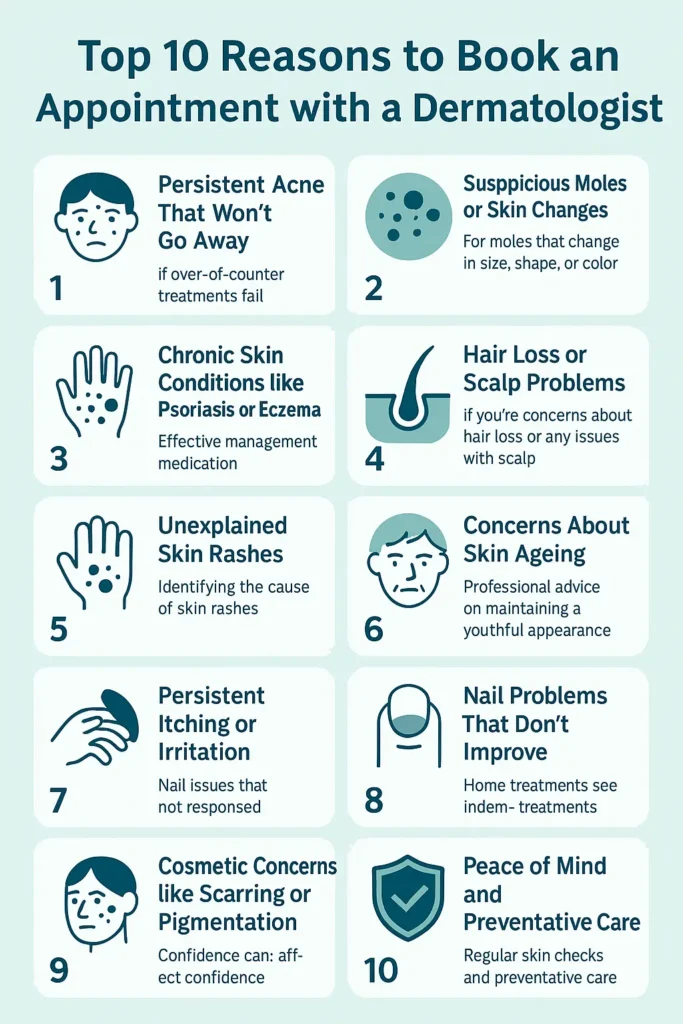When it comes to looking after your health, your skin deserves just as much attention as anything else. It’s the largest organ of your body, your first line of defence against the outside world, and often the first place to show signs when something’s not quite right internally. Yet many of us put off seeing a dermatologist until a problem becomes too big to ignore. Whether you’re dealing with persistent acne, worrying moles, hair loss, or simply want to keep your skin looking its best, booking a consultation with a dermatologist can make a huge difference. In this article, we’ll walk you through the top 10 reasons why seeing a dermatologist could be one of the best decisions you make for your skin—and your overall wellbeing.
1. Persistent Acne That Won’t Go Away
It’s easy to dismiss acne as something that just happens to teenagers. But the truth is, acne can persist well into adulthood—and when it does, it’s often far more stubborn. Over-the-counter treatments sometimes help, but if you’ve tried a few and your skin’s still flaring up, it’s a clear sign it’s time to see a dermatologist. They can assess what’s really causing the problem, whether that’s hormonal imbalances, underlying medical conditions, or something else entirely.
Persistent acne can take a real toll on your confidence, too. It’s not just about vanity—it’s about feeling comfortable in your own skin. A dermatologist can offer prescription-strength treatments, from topical creams to oral medications, that target your specific type of acne more effectively than anything you can buy off the shelf. They can also guide you through skincare routines that support your recovery without causing more irritation.
Another important reason to tackle persistent acne professionally is to prevent long-term damage. Severe or prolonged acne can leave scars, pigmentation, and texture issues that are much harder to fix later. A dermatologist can recommend early interventions like chemical peels, laser therapy, or even light treatments to protect your skin’s future.

Finally, seeing a dermatologist can help you manage the emotional side of dealing with acne. It’s not unusual to feel anxious, embarrassed, or frustrated. Dermatologists are used to supporting patients through this, offering not just treatment but reassurance. They can help you set realistic expectations and celebrate the small wins along the way.
2. Suspicious Moles or Skin Changes
Moles aren’t always something to worry about—but when they change in size, shape, or colour, it’s time to take action. Spotting the signs early can make a massive difference when it comes to skin cancer detection. Dermatologists are trained to recognise the subtle differences between harmless moles and those that may need further investigation.
Booking an appointment means you can have a full skin check, not just the one mole you might be worried about. Dermatologists often spot issues you might miss yourself, especially in areas that are hard to see like your back, scalp, or behind your ears. Early detection is key—if caught soon enough, skin cancers like melanoma are highly treatable.
It’s also worth remembering that not all changes are immediately obvious. Sometimes a mole might feel different rather than look different—it could become itchy, tender, or start to bleed. These symptoms are just as important as visual changes, and a dermatologist can quickly assess and decide whether further testing, like a biopsy, is needed.
Even if the mole turns out to be harmless, having it checked gives you peace of mind. Regular skin checks are a smart part of a preventative healthcare routine. If you get into the habit now, you’re investing in your long-term health and catching any problems early, when they’re easiest to treat.
3. Chronic Skin Conditions like Psoriasis or Eczema
Living with a chronic skin condition like psoriasis or eczema can be exhausting. Flare-ups can happen without warning, and symptoms like itching, redness, and scaling can affect every part of your life, from sleep quality to social confidence. If you’re relying on over-the-counter creams and still struggling, it’s definitely time to see a dermatologist.
Dermatologists can offer treatments that go beyond the pharmacy shelf. They might prescribe topical steroids, immunomodulators, or recommend phototherapy treatments, depending on the severity of your condition. They’ll also work with you to build a long-term management plan, helping you identify triggers and adjust your routine to minimise flare-ups.
Another big advantage of seeing a dermatologist is access to the latest treatments. New therapies, including biologic injections, have transformed the outlook for many people with chronic skin conditions. Dermatologists stay up-to-date with these developments and can advise if you might be a good candidate.

Just as importantly, they understand the emotional and psychological impact of living with skin conditions. They’ll treat you as a whole person, not just a set of symptoms. By working together, you can build a sustainable strategy that improves both your skin’s health and your overall quality of life.
4. Hair Loss or Scalp Problems
Hair loss can be incredibly distressing, whether it’s gradual thinning or sudden shedding. Often, it’s dismissed as a cosmetic issue—but it’s usually a sign that something deeper is going on, and that’s where a dermatologist comes in. They’re experts not only in skin but also in hair and nails, making them perfectly placed to help.
A dermatologist will start by investigating the cause of your hair loss. It could be genetic, hormonal, autoimmune, nutritional, or even stress-related. Understanding the root cause is vital because the right treatment depends entirely on what’s behind the problem. Guessing your way through shampoos and supplements usually won’t cut it.
Depending on your diagnosis, your dermatologist might suggest treatments like topical minoxidil, oral medications, platelet-rich plasma (PRP) therapy, or in some cases, referral for hair transplantation. They’ll also advise you on lifestyle and nutrition factors that could help support your hair’s health over time.
Beyond treating hair loss, dermatologists also tackle scalp conditions like seborrhoeic dermatitis, psoriasis, and fungal infections, which can contribute to shedding and discomfort. They can recommend medicated shampoos, prescription treatments, and care routines that soothe and strengthen your scalp, setting the stage for healthier hair growth.
5. Unexplained Skin Rashes
We all get the odd rash from time to time, but when a rash lingers, spreads, or becomes increasingly uncomfortable, it’s important to get it looked at. Some rashes can indicate allergies, infections, autoimmune diseases, or even more serious systemic conditions. A dermatologist can help you find out exactly what’s going on.
Trying to self-diagnose a rash using internet searches can be frustrating—and dangerous. Many different skin conditions look remarkably similar to the untrained eye. What you think is an allergic reaction might actually be an infection, or vice versa. A dermatologist can make an accurate diagnosis and get you on the right treatment path.
Treatment options vary widely depending on the cause. You might need antihistamines, corticosteroids, antibiotics, antifungals, or even specialised creams that modify your immune response. Dermatologists can tailor the treatment exactly to your situation, helping you clear the rash quickly and minimise the risk of complications like scarring or pigment changes.
Sometimes, rashes are a sign of an internal issue that needs broader attention. For example, lupus and other autoimmune diseases often present with skin symptoms first. A dermatologist can spot these warning signs and refer you for further investigations if needed, ensuring you get the right multidisciplinary care early on.

6. Concerns About Skin Ageing
Ageing is natural—but that doesn’t mean you have to accept every line, wrinkle, or pigmentation spot without support. If you’re concerned about the signs of ageing, a dermatologist can offer you professional advice and safe, evidence-based treatments to refresh your appearance while preserving your natural beauty.
Dermatologists have access to medical-grade treatments that simply aren’t available on the high street. These might include prescription creams containing retinoids, in-clinic chemical peels, microneedling, laser resurfacing, or injectable treatments like Botox and fillers. They can design a plan that’s bespoke to your skin, your goals, and your comfort level.
Importantly, dermatologists can guide you through ageing-related skincare choices with an expert eye. They’ll advise on what products are genuinely worth your money—and which ones aren’t. Plus, they’ll help you understand how sun protection, hydration, and lifestyle choices impact your skin’s ageing process over time.
Another reason to work with a dermatologist on ageing concerns is safety. A lot of anti-ageing treatments are offered by poorly regulated providers. By choosing a medical professional, you’re ensuring that your treatments are performed with a deep understanding of facial anatomy and a commitment to natural-looking results.
7. Persistent Itching or Irritation
Itching might seem like a small problem—but if it’s persistent, it can drive you to distraction. Chronic itching can seriously disrupt sleep, work, and daily comfort. And scratching too much can cause secondary infections or even scarring. If you’ve tried moisturisers and antihistamines with no success, it’s time to call in a dermatologist.

Itching can have dozens of underlying causes, from dry skin and eczema to allergies, liver disease, kidney issues, and even nerve problems. A dermatologist can assess your symptoms, perform tests if needed, and figure out why you’re itching in the first place. Treating the cause is much more effective than just soothing the symptoms.
Your dermatologist might suggest targeted treatments like prescription creams, antihistamines, or phototherapy, depending on your condition. They’ll also provide guidance on lifestyle changes that could make a difference, such as switching to fragrance-free skincare, improving humidity in your environment, or adjusting your laundry products.
Beyond physical relief, tackling chronic itching can significantly improve your emotional wellbeing. Persistent discomfort can lead to anxiety, irritability, and even depression over time. Seeking professional help ensures that you’re not suffering in silence—and that you’re giving your body the best chance to heal.
8. Nail Problems That Don’t Improve
It’s easy to overlook nails when thinking about skin health, but they’re a crucial window into what’s going on inside your body. If you’re dealing with thickened, discoloured, brittle, or infected nails that just don’t seem to improve, a dermatologist is the right expert to consult.
Common nail problems like fungal infections, psoriasis-related nail changes, or trauma-related damage can often be misdiagnosed or mistreated with over-the-counter products. A dermatologist can properly assess the problem, run diagnostic tests if necessary, and recommend treatments that are much more effective.
Sometimes, nail issues can be an early warning sign of systemic conditions like diabetes, thyroid disorders, or circulatory problems. Dermatologists are trained to spot these links and can refer you for further investigations if needed, ensuring any broader health problems are picked up early.
On a practical level, treating nail problems promptly can save you a lot of discomfort, inconvenience, and even embarrassment. Healthy nails don’t just look good—they’re an important part of your overall health. A dermatologist can help you get them back on track with expert care.
9. Cosmetic Concerns like Scarring or Pigmentation
Whether it’s acne scars, sunspots, melasma, or uneven skin tone, cosmetic skin concerns can affect how you feel about yourself. And while they might not be life-threatening, they absolutely matter when it comes to your confidence and quality of life. Dermatologists can offer safe, effective treatments tailored to your needs.
They have a wide range of options at their fingertips, from laser therapies and microneedling to chemical peels and prescription creams. Importantly, they can assess your skin type and medical history to recommend the treatments most likely to work for you—and avoid ones that could cause irritation or worsening.

One of the big advantages of working with a dermatologist is the ability to create a realistic, step-by-step plan. Some skin concerns take time to improve, and a professional can help you set expectations, track your progress, and adjust your treatment as needed for the best results.
Above all, addressing cosmetic concerns professionally means you’re treating your skin with respect. DIY remedies can sometimes do more harm than good. A dermatologist will help you protect and nourish your skin while enhancing your natural beauty in a safe, sustainable way.
10. Peace of Mind and Preventative Care
Sometimes, the best reason to book a dermatology appointment is simply for peace of mind. You don’t have to wait until there’s a problem. Regular skin checks, advice on sun protection, and general skin health reviews are a fantastic investment in your wellbeing.
Preventative dermatology helps you spot issues early—before they become bigger problems. Catching a suspicious mole early, managing sun damage before it progresses, or learning how to care for sensitive skin properly can all have lifelong benefits. Dermatologists can teach you how to monitor your own skin and when to seek help.
It’s also a chance to get professional advice tailored to your individual needs. Everyone’s skin is different, and what works for your friend or family member might not work for you. A dermatologist can help you understand your own skin’s quirks and build a care routine that keeps you feeling your best.
Most importantly, taking proactive steps shows that you value your health and wellbeing. Skin is your body’s largest organ—and looking after it properly is a sign of self-respect. Booking an appointment with a dermatologist is a positive, empowering act that sets you up for a healthier future.
Final Thoughts
Your skin tells a story—it reflects your health, your habits, and sometimes, underlying issues that need closer attention. Booking an appointment with a dermatologist isn’t just about tackling visible problems; it’s about investing in your confidence, your wellbeing, and your future health. Whether you’re worried about a stubborn rash, curious about improving your skincare routine, or simply want reassurance that everything is as it should be, a dermatologist can offer expert guidance tailored to you.
It’s easy to fall into the trap of ignoring small issues or trying to manage them yourself, but professional support makes all the difference. Dermatologists are trained to spot problems early, offer treatments you can’t get over the counter, and guide you through the often overwhelming world of skincare with clarity and care. You don’t have to navigate it alone. If you’d like to book a consultation with an expert private dermatologist, you can get in touch with us here at The London Dermatology Centre—our team would be happy to help.
Taking the step to see a dermatologist is an act of self-care that goes beyond appearances. It’s about making your health a priority, listening to your body, and making informed choices with the support of someone who truly understands your skin’s needs. No concern is too small, and no goal is too ambitious when you have the right professional on your side. So, whether you’ve been putting it off or simply hadn’t thought about it before, there’s no better time to put your skin first. Booking that appointment might just be the start of a journey towards clearer, healthier, and happier skin—and you deserve nothing less.
